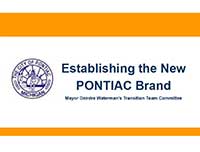For the final session of Convention, we brought together three experienced community professionals to share their insights on adapting to challenging circumstances and moving your community forward.
ROSALYNN BLISS has served Grand Rapids as a commissioner since 2006, and became mayor-elect in August. From that vantage point, she has seen what the city can accomplish when it empowers its citizens.
 One example she cited was Green Grand Rapids, an initiative that established a number of environmental goals for the city, such as adding bike lanes and greenspace, and restoring the river. The city didn’t have the financial resources to bring all those goals to fruition, so they strongly encouraged residents to step up and help. People responded with enthusiasm, and the city helps where it can. An urban forestry committee took on the task of restoring the tree canopy, planting more trees, and diversifying the tree stock. The West Michigan Bicycle Coalition advocated for more bike lanes and helped create new city policies. And Grand Rapids Whitewater is looking into providing more access to the Grand River and restoring the rapids.
One example she cited was Green Grand Rapids, an initiative that established a number of environmental goals for the city, such as adding bike lanes and greenspace, and restoring the river. The city didn’t have the financial resources to bring all those goals to fruition, so they strongly encouraged residents to step up and help. People responded with enthusiasm, and the city helps where it can. An urban forestry committee took on the task of restoring the tree canopy, planting more trees, and diversifying the tree stock. The West Michigan Bicycle Coalition advocated for more bike lanes and helped create new city policies. And Grand Rapids Whitewater is looking into providing more access to the Grand River and restoring the rapids.
Grand Rapids enlists the help of citizens for more neighborhood-specific challenges as well. Bliss shared the experience of one neighborhood that wanted to convert an old parking lot into a park. Neighbors helped pass a special assessment, the city kicked in some available funds, and now the site is an amazing park. Another neighborhood, adjacent to Fulton Street Farmers Market, wanted to redevelop the market to make it more attractive and ADA compliant. The Fulton Street Farmers Market Redevelopment Committee was able to raise $2 million for the project. Along with city help for improvements to water, sewer and grading, the market now looks great.
When citizens come to you with ideas, Bliss says, figure out a way to say yes. Review your resources, empower your people, and watch great things happen.
 CLAIRE NELSON’S experiences in community engagement in Detroit have given her a different view of the role of government. The founder of Urban Consulate says that she and her colleagues don’t really expect the city to help because they understand its limitations. They’ve learned to rely on other sources of help to foster civic projects, such as the Urban Innovation Exchange. This group identifies, catalogues, and connects people across Detroit who are starting projects in their community, such as taking care of vacant lots or starting after school programs. These people are seeing gaps in their community and stepping up. Nelson says lots of small scale changes like this add up to a much larger economic impact.
CLAIRE NELSON’S experiences in community engagement in Detroit have given her a different view of the role of government. The founder of Urban Consulate says that she and her colleagues don’t really expect the city to help because they understand its limitations. They’ve learned to rely on other sources of help to foster civic projects, such as the Urban Innovation Exchange. This group identifies, catalogues, and connects people across Detroit who are starting projects in their community, such as taking care of vacant lots or starting after school programs. These people are seeing gaps in their community and stepping up. Nelson says lots of small scale changes like this add up to a much larger economic impact.
Nelson cautions that after the energetic launch of these projects, their leaders often need training and leadership development to keep the ball rolling. She shared the example of Declare Detroit, an effort she was involved with, whose aim was to influence Detroit policy and encourage people to run for office. Their only promotion was a Facebook page listing their 12 principles, which managed to get 15,000 likes. Some General Motors marketing people got wind of their effort and offered to help with training to get their initiative to the next level.
Nelson’s advice is to think of projects that might shift and change over time and empower people to move them to the next level. The role of city is to value those people, even if they’re doing things in an untraditional way.
 DEIRDRE WATERMAN had a real challenge on her hands when she stepped into the role of mayor of Pontiac. An ophthalmologist by profession, Dr. Waterman was a longtime business owner and operated her practice, Holloway Eye Care, in Pontiac for over 30 years. Now, with only 30 employees, she’s responsible for steering the city in the right direction following several years of control under emergency financial managers.
DEIRDRE WATERMAN had a real challenge on her hands when she stepped into the role of mayor of Pontiac. An ophthalmologist by profession, Dr. Waterman was a longtime business owner and operated her practice, Holloway Eye Care, in Pontiac for over 30 years. Now, with only 30 employees, she’s responsible for steering the city in the right direction following several years of control under emergency financial managers.
In an effort to stabilize the city’s finances, the emergency managers had sold off a number of the city’s assets, including the Silverdome, outsourced many city services, and left the city demoralized. Waterman viewed her first job as restoring her citizens’ morale, saying it would be difficult to get people to invest in the community until they believed in themselves.
Waterman knew she had a skilled workforce she could galvanize, so she adopted that stance that she was going to empower them to create ideas to improve the community and she would support them. Several of those people with ideas were placed on the transition committee. One of the committee’s jobs was to draft the 2014 Master Plan, which now contains entrepreneurial districts and is more flexible for developers. That, along with things like streamlined policies and processes online, sends the message that Pontiac is open to new business.
Visioning sessions led to the formation of groups willing to take on city projects for which they had a passion. Devoted groups of people are managing blight and redeveloping downtown as a more people-friendly area with more greenspace, bike paths, and connection to neighborhoods.
That’s the kind of spirit Waterman is trying to foster in Pontiac – empowering people with ideas and expertise to step up and help the city move forward. She’s trying to create a new narrative of what Pontiac is, and including those ideas in the new economic development plan so everyone is on the same agenda.

